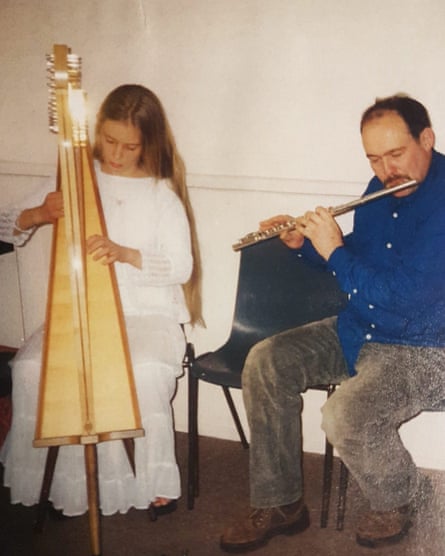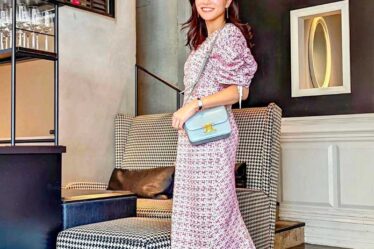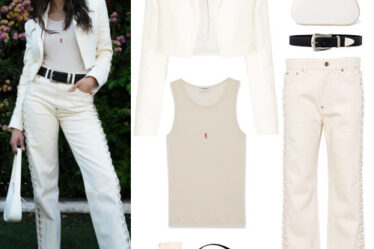
The day I first came across a harp is a memory stored in all my senses. The sound of the strings, the pleasing curve of the neck, the smell of the May blossom that was dancing on the breeze. It was love at first sight, that is for sure. In contrast to the vivid colour in which I recall this first encounter, I also remember my parents’ faces turning pale when I announced: “I’m going to play the harp!”
We were at a school fair. My parents had scrimped and saved to send my two brothers and me to a Steiner school, where the arts and creativity are held in equal regard to academic achievement.
My father was, and still is, an incredibly talented musician. He never said as much, but part of him clearly always hoped that one of his children might be drawn to music. Up to the age of 10, I had shown no interest in any instrument, despite regularly going to sleep to the sound of live music drifting up the stairs. But when I saw the harp, I knew it was the one. It was such a strong and certain feeling. People often ask me: “Do you play many instruments, or just the harp?” What they fail to realise is that I didn’t choose the harp as one would a pair of shoes – I fell in love with it. I can’t imagine playing anything else.
My parents’ ashen faces reflected their financial fears: why oh why had their daughter fallen in love with the most expensive instrument of all?
They made a deal with me: I could have a cymbala (essentially a cheap lyre), and if I played that and showed enough interest for a year, they would save up so I could have harp lessons. Although I didn’t love the cymbala, I did enjoy it, and played it regularly to prove to my parents that I hadn’t forgotten about the harp. A year later, all my dreams came true. They had rented me a little harp and hired the man I’d seen playing at the school fair to teach me.
The early days were joyous. I was so proud of every little tune I learned. I felt complete every time I plucked the strings. Then something happened: sheet music. Suddenly I had to learn this foreign language in order to continue to play. What was once an effortless pleasure turned into a constant struggle. My dyslexic brain fed on the beauty of the music, but fought with the way it was taught. I soon found myself stuck in a love-hate relationship, desperate to hold on to all that I loved about the harp, but angry at my brain for not allowing me to keep up.
In my teenage years, my relationship with my harp was as unpredictable as my mood swings. I would spend hours trying to play the tunes of the ancient harpers, and weeks looking at my harp with anger and frustration. For my 16th birthday, my parents used their savings to buy me a locally made harp, in the hope that it might settle my relationship with it.
I was delighted to have a harp of my own. But in the weeks that followed it was clear to see that this instrument was sick. First it lost its resonance, then the soundboard began to crack. One day there was a huge bang: the soundboard had pulled through and the harp exploded.
My parents contacted the harp maker, but there was no reply. Eventually they went to his house, where they met his family. As the harp had become unwell, so had the harp maker. And on the day the harp exploded, its maker took his own life. We were all in shock. My parents had no choice but to walk away empty-handed, all their savings gone in an instant.
For several weeks, the remains of the harp sat at the bottom of our stairs. No one knew what to do. It was a pile of broken wood, but also all their savings and a representation of a man’s life. We decided there was only one thing to do: burn it. We built a fire on top of a hill looking out on to the River Dart. It felt strange to burn something that represented so much. As the flames devoured the wood, we all sat there staring in silence.
“I guess this is it for me and the harp,” I said to my dad. “I wasn’t very good at it anyway. I don’t think I will ever be able to read music.”
“It’s not about being able to read music,” he said. “It’s called playing music for a reason. Have you ever thought about just playing?”
Something about what he said, and the poignancy of the moment in which he said it, changed everything for me.
“Yeah, but I don’t have a harp any more anyway,” I said.
Two weeks later, an old, small, battered harp turned up. “It’s not yours,” Dad told me. “We can’t afford one, not after what happened.” But my insides leapt with joy at the sight of it.
There was something old and wise about this harp. When I played it, I really played. I threw away all my music and books. It was effortless again. I started playing by ear and from the heart. I composed new tunes and rearranged old ones. All the colour and passion that I had felt in the beginning came back.
I was always very drawn to ancient Irish harp tunes, and I found out that the traditional harpers of Ireland never used sheet music – they predate the whole concept of it altogether. I no longer felt like a failure and a fraud. It was proof that there was more than one way forward.
When I turned 18, that little harp became mine officially, and we would go on to travel the world. We lived in Australia, where together we seduced my now husband, Creag. We busked our way around Europe and walked the Camino de Santiago. We spent evenings with people from all corners of the globe, not saying a word, communicating beyond language. Then, when my harp became too old to put up with baggage handlers and aeroplane holds, Creag made me a harp. To this day, he is a harp maker and I am a harp teacher.
Being good at reading music isn’t what makes a good musician. So many musically creative people never get to know how great they are. My musical journey inspired me to create a neurodiverse-friendly harp called the Rainbow Harp, and a composition method that is accessible to everyone. Earlier this year, I spoke at the World Harp Congress. There I met talented musicians at the top of their game who had let their love for their instrument turn into a burden on their mental health. Music has the power to express that which words can’t. It should be a medicine for our mental health problems, not the cause of them.
Music is so much more than dots on a page. If you feel it, love it and are excited by it, don’t give up. Had I let traditional music teaching techniques put me off playing the harp, I would have lost a part of myself.


